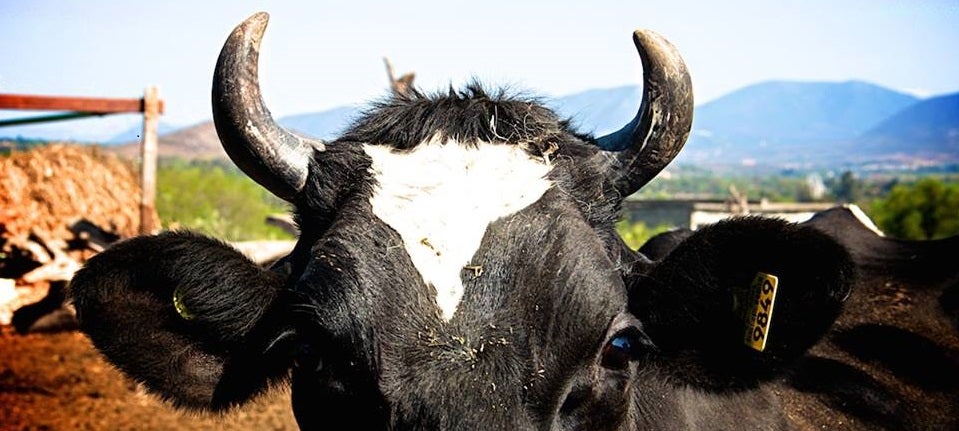* By Ignacio Fernández Admetlla
Sistema Biobolsa is a social enterprise that manufactures, distributes, sells, and installs anaerobic bio-digesters that transform farm waste into renewable energy (biogas) and organic fertilizer to small and medium-sized farmers. A project supported by the MIF–OMJ accelerator program is now trying to strengthen the sustainability of Sistema Biobolsa’s business model.
The technology behind the Sistema Biobolsa is a high quality geo-membrane that offers a more anti-seismic and climate resistant alternative to the traditional brick and mortar biodigestors. The units are built to last for 30 years and allow families to move them or increase their capacity according to their needs. The mechanism for its use is very simple. Families introduce farm waste into a container that feeds the main reactor where the decomposition of the waste takes place. Through a tube at the top of the reactor the biogas is channeled to the household, while the organic fertilizer exits to another container at the other end of the reactor.
When we first began designing our project, we knew that there were several risks involved. We were working with a company that hadn’t reached break-even yet, that needed to demonstrate its capacity to sell their product consistently and to prove its unique technology based on a plastic reactor instead of the traditional brick-and-mortar construction. We were curious to find out how the company had fared in the last year so we went to visit them in Mexico.
We were pleased to learn that Sistema Biobolsa will close out its first profitable year since launching in 2010. It has now expanded its network of clients to over 2,000 farms, and recently recorded its most profitable week after selling 120 new Sistema Biobolsa units. Starting in 2015, the company will receive a three-year revolving US$ 100,000 donation from the Greater Impact Foundation, which has also extended a US$ 200,000 working capital loan to the company. Sistema Biobolsa also plans to reach more clients by expanding its credit line with KIVA from US$200,000 to US$400,000, a successful partnership that is allowing the company’s clients to get financing at 0% interest in an average of 24 hours.
In Puebla, at the company’s main sales office, we met Regional Director Irene Sánchez, who says the company’s recent success is fueled by a staff that not only works hard, but also truly believes in the quality of Sistema Biobolsa and the impact that it can have on people’s lives. According to Ms. Sánchez, “I would never go out and convince families to spend their money on something I didn´t believe in. I have a Sistema Biobolsa. I use it with the waste from my animals and cook every day with the biogas it produces. My whole family showers with warm water heated by biogas as well.” Ms. Sánchez explain the advantages of the system with her own words in the following video:
[vsw id=”asHjt8Zo4k0″ source=”youtube” width=”550″ height=”425″ autoplay=”no”]
We then set out to visit a few of their clients. Accompanied by Edgar, one of the technicians on staff, we head out to nearby Tlaxcala. The first house we visited belongs to José and Maria Antonieta, who bought their unit just three months ago. Their system is producing more biogas than they’re able to consume. They are a five-person household and since installing the product they are using the biogas to cook all their meals and heat water twice a day.
At the second farm we met Carolina and her daughter Patricia, arguably the quirkiest farmer in all of Mexico. The Sistema Biobolsa can range from 4 to 40 cubic meters and about a year ago Carolina purchased a medium-sized unit. She hasn’t had time to empty out the organic fertilizer and introduce new animal waste, but the system still provides biogas for up to a month. Patricia tells us, “After I stopped buying gas containers from the local distributor, the owner of the company stopped by to see why. I showed him the Sistema Biobolsa … he left the house speechless.” Our visit is forever immortalized in the guest book Patricia asks every visitor to sign.
In our last visit we meet Florentino, who points above his head when explaining how high the corn plants have grown after using organic fertilizer from the Sistema Biobolsa. He’s buying half as much chemical fertilizer as he used to, and buys gas containers only every now and then when his family has extra needs.
We returned to Mexico City pleased to see that the company has exceeded our expectations -and theirs-in the past year. Camilo Pagés, CEO of Sistema Biobolsa, explains that the number of potential clients in Mexico is practically endless. As he puts it, “There are hundreds of thousands of low-income farmers in Mexico who aren’t utilizing their waste and who could save greatly with the Sistema Biobolsa. It’s just a matter of us finding a sustainable way of growing our business model so that they can have access to our product.”
I think Sistema Biobolsa is a great example of how we can find innovative solutions for improving the quality of life of Latin American people, by combining innovation, technology and a fresh approach to development problems.
* Ignacio Fernández Admetlla works as a consultant of the Access to Basic Services Unit of the Multilateral Investment Fund (MIF), a member of the IDB Group.



Leave a Reply